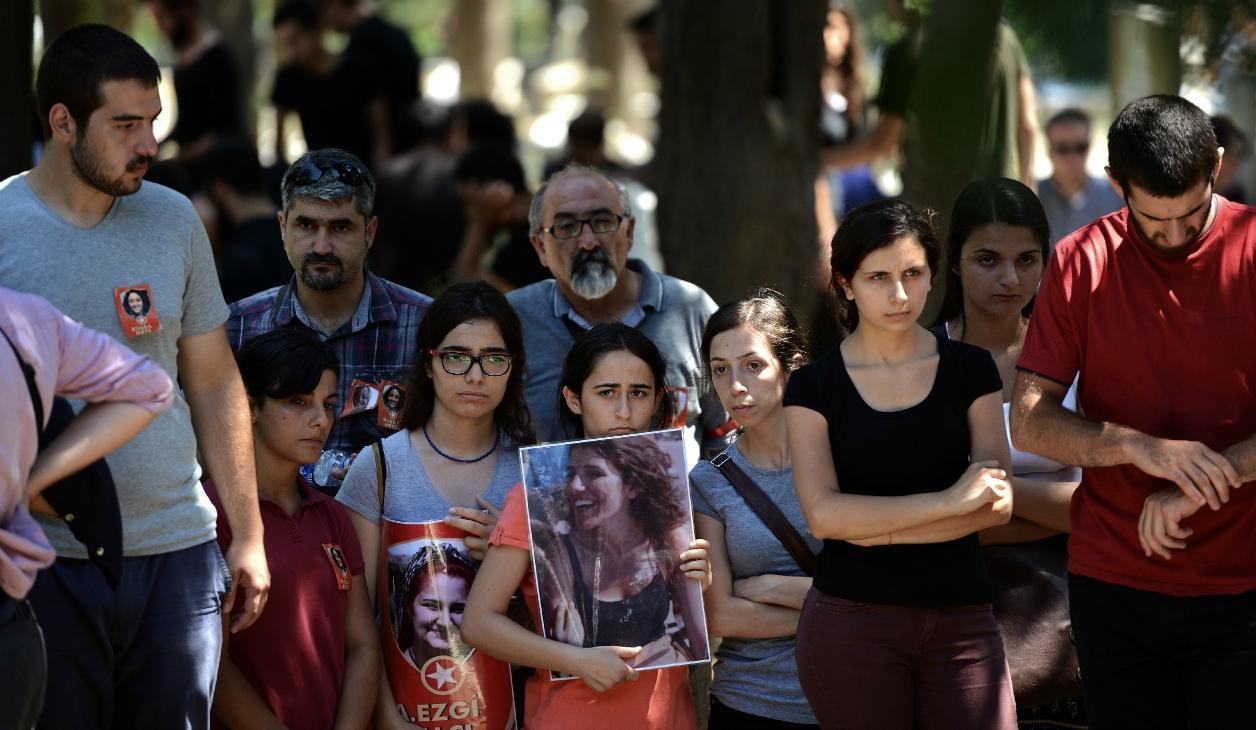Turkey blames IS for suicide attack that killed 32 in Suruc
Mourners hold posters of victims, who were killed during a suicide bomb attack two days before in the southern Turkish town of Suruc, as they attend the funeral of victim Ece Dinc on July 22, 2015 in Istanbul.
Turkey on Wednesday identified the perpetrator of a deadly suicide bombing blamed on Islamic State (IS) extremists as a 20-year-old man from its southeast, as the government prepared new measures to protect the porous border with Syria.
With the country still shaken by Monday's bombing in Suruc, close to the Syrian border, two police were found shot dead in their homes in a nearby town but it was unclear if there was a terror link.
Hundreds rallied in Istanbul and other cities late Tuesday to condemn the bombing and protest at government policies on Syria before being dispersed by police wielding tear gas and water cannon.
The suicide bombing claimed 32 lives, making it one of the deadliest attacks in Turkey in recent years.
It was the first time the government directly blamed IS for a strike inside the country.
Prime Minister Ahmet Davutoglu was later Wednesday to chair a cabinet meeting on an "action plan" to improve security on the border with Syria.
Turkey has long been accused by its Western partners of failing to properly control the 566-mile frontier and even of colluding with IS, allegations it fiercely denies.
"I declare it to our esteemed nation and the entire world once again: Daesh and similar terrorist organizations will never achieve their target," Davutoglu said in a message on Twitter, using a pejorative Arabic acronym for IS.
'Turkish man, aged 20'
The victims of the attack were activists, many of them students, who had gone to Suruc to prepare an aid mission for the Syrian town of Kobane just over the border.
According to Turkish press reports the youngest casualty was Okan Pirinc from the Hatay region in southern Turkey, aged 18.
A Turkish official said DNA testing had confirmed a 20-year-old Turkish man reportedly linked to IS militants carried out the suicide bombing.
"As a result of DNA tests, we confirm that the assailant is a 20-year-old man registered in Adiyaman," the official said on condition of anonymity, referring to a province in southeastern Turkey.
Media reports had earlier said the man — a university student identified by his initials S.A.A. — had first become involved with IS militants two months ago.
The group, which has captured swathes of territory in Syria and Iraq adjoining the Turkish border, has so far not claimed the Suruc bombing.
Turkish authorities are also investigating if there is any connection between the Suruc assault and a deadly attack in the Kurdish majority city of Diyarbakir last month that killed four people.
The attack risks dramatically ratcheting up tensions inside Turkey, with its Kurdish minority frustrated the government has not done enough to counter the rise of IS.
The pro-Kurdish Peoples' Democratic Party (HDP) has called for a major protest at the weekend.
The attack has come at a critical time in Turkey following elections where the ruling Justice and Development Party (AKP) of President Recep Tayyip Erdogan lost its overall majority in parliament for the first time since coming to power in 2002.
Two Turkish police were found dead in the southeastern town of Ceylanpinar on the Syrian border but it was unclear whether the attack had "terrorist connections," Turkish television quoted the governor of Sanliurfa region, Izzettin Kucuk, as saying.
NTV television and the state news agency Anatolia quoted Kucuk as saying the police had been found dead in an apartment building.
The Hurriyet daily reported both had been shot in the head.
A Turkish court has ordered a ban on publishing of images of the deadly suicide bombing in Suruc on all print, visual and online media, including Twitter, a Turkish official said.
The official insisted no formal ban had been placed by the Turkish authorities on the use of Twitter — where many of the images had been posted — as users complained they could not access their accounts inside the country.
But as Twitter is unable to take down every image related to the suicide attack, users could face problems, the official acknowledged.
"We are holding talks with Twitter to address this problem," the official said.
We want to hear your feedback so we can keep improving our website, theworld.org. Please fill out this quick survey and let us know your thoughts (your answers will be anonymous). Thanks for your time!
